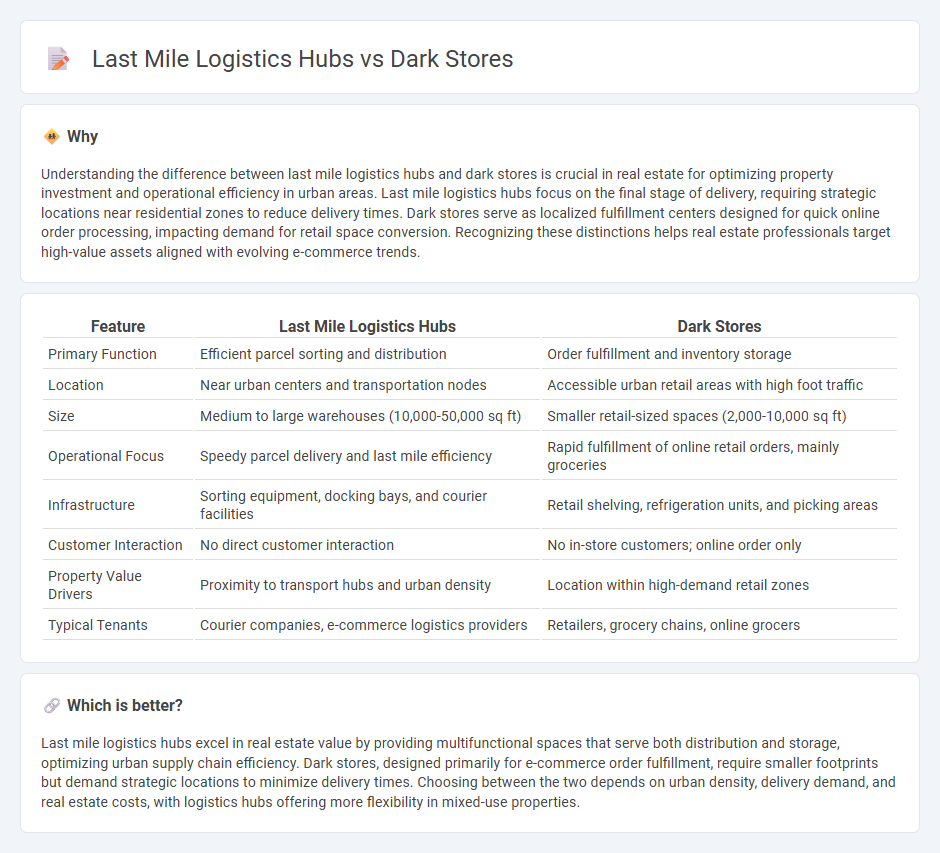
Last mile logistics hubs prioritize efficient urban distribution by serving as centralized fulfillment points for e-commerce deliveries, reducing transit times and enhancing supply chain speed. Dark stores function as retail spaces reconfigured exclusively for online order picking, enabling faster inventory access and improved delivery accuracy. Explore the key differences and advantages of these real estate models to optimize your logistics strategy.
Why it is important
Understanding the difference between last mile logistics hubs and dark stores is crucial in real estate for optimizing property investment and operational efficiency in urban areas. Last mile logistics hubs focus on the final stage of delivery, requiring strategic locations near residential zones to reduce delivery times. Dark stores serve as localized fulfillment centers designed for quick online order processing, impacting demand for retail space conversion. Recognizing these distinctions helps real estate professionals target high-value assets aligned with evolving e-commerce trends.
Comparison Table
| Feature | Last Mile Logistics Hubs | Dark Stores |
|---|---|---|
| Primary Function | Efficient parcel sorting and distribution | Order fulfillment and inventory storage |
| Location | Near urban centers and transportation nodes | Accessible urban retail areas with high foot traffic |
| Size | Medium to large warehouses (10,000-50,000 sq ft) | Smaller retail-sized spaces (2,000-10,000 sq ft) |
| Operational Focus | Speedy parcel delivery and last mile efficiency | Rapid fulfillment of online retail orders, mainly groceries |
| Infrastructure | Sorting equipment, docking bays, and courier facilities | Retail shelving, refrigeration units, and picking areas |
| Customer Interaction | No direct customer interaction | No in-store customers; online order only |
| Property Value Drivers | Proximity to transport hubs and urban density | Location within high-demand retail zones |
| Typical Tenants | Courier companies, e-commerce logistics providers | Retailers, grocery chains, online grocers |
Which is better?
Last mile logistics hubs excel in real estate value by providing multifunctional spaces that serve both distribution and storage, optimizing urban supply chain efficiency. Dark stores, designed primarily for e-commerce order fulfillment, require smaller footprints but demand strategic locations to minimize delivery times. Choosing between the two depends on urban density, delivery demand, and real estate costs, with logistics hubs offering more flexibility in mixed-use properties.
Connection
Last mile logistics hubs and dark stores are integral components of modern real estate strategies optimizing urban delivery networks. These facilities require strategically located commercial real estate to reduce delivery times and enhance supply chain efficiency in densely populated areas. Real estate investment in these types of properties reflects the growing demand for proximity warehousing driven by e-commerce growth and consumer expectations for rapid delivery.
Key Terms
Fulfillment Center
Dark stores operate as localized fulfillment centers optimized for rapid order processing and inventory management, enabling quick e-commerce delivery. Last mile logistics hubs concentrate on distribution efficiency, serving as strategic points to expedite final parcel delivery to consumers. Explore the distinctions and advantages of these fulfillment centers for optimized supply chain strategies.
Urban Warehousing
Dark stores serve as localized retail fulfillment centers designed to expedite online order processing, primarily focusing on inventory storage and quick picking within urban areas. Last mile logistics hubs optimize the distribution network by acting as strategic transshipment points that streamline final delivery routes, improving speed and reducing costs in densely populated cities. Explore deeper insights into urban warehousing strategies and their impact on efficiency and customer satisfaction.
Delivery Radius
Dark stores operate as localized fulfillment centers positioned closer to urban customers, typically covering a delivery radius of 3 to 5 miles to ensure rapid order processing and minimize delivery times. Last mile logistics hubs often serve broader areas, extending their delivery radius up to 10 miles or more, focusing on efficient route optimization and bulk order consolidation to streamline final-mile distribution. Explore deeper insights into how delivery radius impacts operational efficiency and customer satisfaction in urban logistics.
Source and External Links
What Is a Dark Store? - A dark store is a brick-and-mortar store repurposed to fulfill online orders, typically situated in suburbs or outskirts, designed for quick and convenient order picking and delivery, and became popular due to the surge in online shopping during the pandemic.
Dark stores in retail: Concept, benefits, challenges ... - Dark stores operate like warehouses optimized for online order picking, packing, and fulfilling, allowing customers to have orders delivered or picked up, with popularity driven by the rise of eCommerce and rapid growth in online retail sales.
Dark store - Wikipedia - A dark store is a retail outlet or distribution center exclusively for online shopping, mainly large warehouses facilitating click-and-collect or direct delivery services, with origins in the UK and expanding worldwide to meet growing demand for rapid grocery delivery.
 dowidth.com
dowidth.com